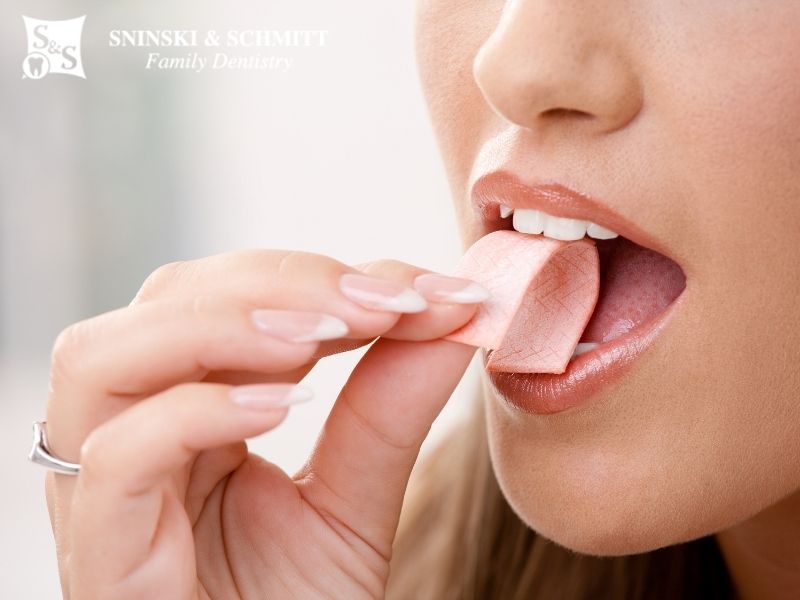Were you aware that chewing gum has good and bad effects? When you think of chewing gum, both the action of chewing as well as the product, you may think it is bad on both fronts automatically. But that isn’t necessarily the case. If the chewing gum is the “right” kind (in other words, sugarless), it can help prevent tooth decay. Additionally, there are other good effects of chewing sugarless gum on your teeth.
The dental team at Sninski & Schmitt provides information in this article that not all chewing gum is bad for your teeth.
The Long History of Chewing Gum
Chewing gum has been around since ancient times. The earliest evidence of humans chewing gum-like substances comes from the convergence of anthropology and dentistry at an archeological site in Sweden. Archeologists found lumps of birch bark tar with tooth impressions of children and adolescents dating back 9,000 years. So, chewing gum in many forms has existed since the Neolithic period.
Additionally, there is evidence that other cultures in history chewed gum. For example, the ancient Greeks chewed on a resin called “mastic” to clean their teeth and freshen their breath. Mastic gum has antiseptic properties and the Greeks believed it contributed to better oral health. The ancient Mayan people chewed a substance called chicle, which came from the sapodilla tree, as a way to quench thirst or fight hunger. Native American Indians chewed on gum from spruce trees to help quench their thirst. They then passed the practice on to the Europeans who settled in New England.
Positive Effects of Chewing Gum
When adding chewing sugarless gum to a regular home oral care routine of twice daily brushing with fluoridated toothpaste and daily cleaning between teeth, you can reduce the risk of cavities.

Chewing sugarless gum causes your mouth to produce more saliva, neutralizing and rinsing away some of the acid that forms in your mouth when you break down food. Chewing gum after a meal can help to protect your teeth and promote oral health. Also, the minerals that are generated by extra saliva can help strengthen tooth enamel, which also reduces your risk of a dental cavity.
Benefits of chewing sugarless gum include:
- Increases saliva flow and volume – The mechanical action and the stimulation of oral taste receptors increase saliva production.
- Strengthens tooth enamel – Some chewing gums add casein phosphopeptide-amorphous calcium phosphate (CPP-ACP), also called Recaldent, to remineralize or slow down tooth decay.
- Prevents cavities – The natural sweetener Xylitol is a naturally occurring sweetener that has been shown (in a 2017 review of multiple studies in the National Library of Medicine) to reduce the amount of bacteria that cause cavities in plaque.
Other Aids to Health
Oral hygiene is important to your overall health. Research published in the Journal of the American Nutrition Association showed that adults who chew sugarless gum have a lower added sugar intake and snack less throughout the day. Studies have shown that periodontal disease is higher among individuals with serious health issues such as diabetes, cardiovascular disease, and obesity. The research suggests that regularly chewing sugar-free gum might mitigate some of these conditions. Additionally, chewing sugar-free gum might help reduce acid reflux due to the presence of bicarbonate, which helps neutralize stomach acid.
Negative Effects of Chewing Gum
Chewing too much gum can cause unwanted bad side effects such as jaw pain, headaches, diarrhea, and tooth decay.
Sugar-Free Gums Contain Laxatives and FODMAPS
The sugar alcohols used to sweeten sugar-free gum have a laxative effect when consumed in large amounts. Therefore, chewing a lot of sugar-free gum can cause digestive distress and diarrhea. Additionally, all sugar alcohols are FODMAPS, which can cause digestive problems for people with irritable bowel syndrome (IBS).
Gum Containing Sugar is Bad for Dental and Metabolic Health
Chewing gum that is sweetened with sugar is bad for your teeth. Sugar is digested by the bad bacteria in your mouth, causing an increase in the amount of plaque on your teeth and tooth decay over time. Eating too much sugar is also associated with several health conditions such as obesity, insulin resistance, and diabetes.
Chewing Gum Too Often Could Cause Problems with Your Jaw
Constant chewing could lead to a jaw problem called temporomandibular disorder (TMD), which causes pain when you chew. Although this condition is somewhat rare, some studies have found a link between excessive chewing and TMD
Chewing Gum Has Been Linked to Headaches
One research review in the National Library of Medicine suggests that regularly chewing gum may trigger headaches in people prone to migraine episodes and tension-type headaches. More research is needed, but the researchers suggested that people who experience migraines may want to limit their gum chewing.
Best Chewing Gum for Your Teeth
There are many options for chewing gum, including sugary, sweet candy. But, instead of selecting a pack of gum that may damage your teeth, pick a sugar-free option with the ingredients that have been shown to fight plaque and tooth decay. The only chewing gums with the ADA Seal are sugar-free. They taste sweet due to additions that do not cause cavities such as aspartame, sorbitol, xylitol, or mannitol.
Contact Sninski & Schmitt Family Dentistry to Schedule your Dental Appointment
If you are coming up on time for your routine dental exam and cleaning, contact the professional dental team at Sninski & Schmitt Family Dentistry. Your oral health depends on keeping regularly scheduled exams and cleanings so you can stay on top of any changes. Call the Holly Springs location at (919) 600-6262 or our dentists in Cary NC at 919-467-2203, or fill out our contact form below to schedule an appointment.

